Command-line interface
Use RustRover features from the command line: open files and projects, view diffs, merge files, apply code style, formatting, and inspect the source code.
The installation directory contains batch scripts and executables for launching RustRover, formatting the source code, and running inspections. To use them from the Command Prompt cmd.exe, add the location of the RustRover bin folder to the PATH environment variable. For example, if you installed RustRover to C:
>set PATH=%PATH%;C:\Program Files\JetBrains\RustRover\bin
This command changes the PATH environment variable for the current shell only (the current instance of cmd.exe). If you want to update it permanently for the current user, run setx:
>setx PATH "%PATH%;C:\Program Files\JetBrains\RustRover\bin"
To update it system-wide for all users, run setx /M instead of setx.
tip
The installer can do this for you if you select Add launchers dir to the PATH on the Installation Options step of the setup wizard.
After you configure the PATH variable, you can run the executable from any working directory in the Command Prompt:
>rustrover.exe
Alternatively, you can use the batch script:
>rustrover.bat
To run RustRover from the shell, use the open command with the following options:
-aSpecify the application.
-nOpen a new instance of the application even if one is already running.
--argsSpecify additional arguments to pass to the application.
For example, you can run RustRover.app with the following command:
$open -na "RustRover.app"
note
If RustRover is not in the default /Applications directory, specify the full path to it.
You can create a shell script with this command in a directory from your PATH environment variable. For example, create the file
#!/bin/sh
open -na "RustRover.app" --args "$@"Make sure you have permissions to execute the script and since PATH environment variable by default, you should be able to run rustrover from anywhere in the shell.
If you do not have permissions to execute the script, run the following:
$chmod +x /usr/local/bin/rustrover
On Linux, the installation directory contains the launcher shell script rustrover.sh under bin. For example, if you installed RustRover to
$/opt/rust/bin/rustrover.sh
You can create a symbolic link to the launcher script in a directory from the PATH environment variable. For example, if you want to create a link named rust in
$ln -s /opt/rust/bin/rustrover.sh /usr/local/bin/rust
Since PATH environment variable by default, you should be able to run the rust command from anywhere in the shell.
If you are using the Toolbox App to install and manage JetBrains products, you can use shell scripts for launching your IDEs from the command line.
Toolbox App generates shell scripts automatically and places them to the following folders:
%LOCALAPPDATA%\JetBrains\Toolbox\scriptsBy default, the Toolbox App puts shell scripts in a directory from the system PATH environment variable, so you can run the name of the script as a command to launch RustRover from any working directory.
Open the Toolbox App, click the Toolbox App menu icon in the top right corner, and select Settings.
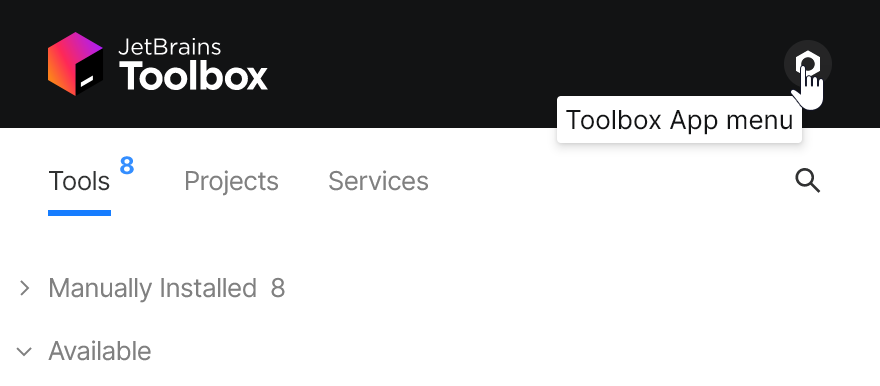
On the Settings tab, expand the Tools section, and specify another folder in the Shell scripts location field.
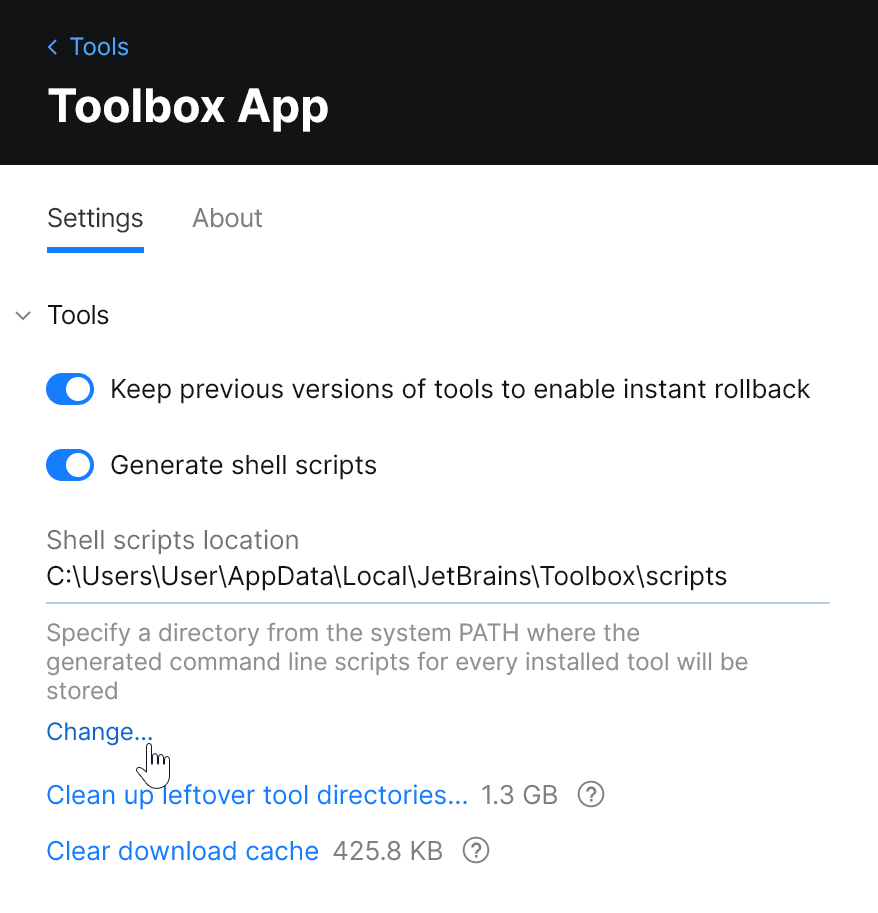
If you have several versions of the same IDE, the Toolbox App generates a shell script for each version with a unique name. You can change the name of the shell script for an IDE instance in the settings for this specific instance.
Open the Toolbox App.
Click
next to an IDE instance and select Settings.
At the bottom of the Configuration section, change the Shell script name field.
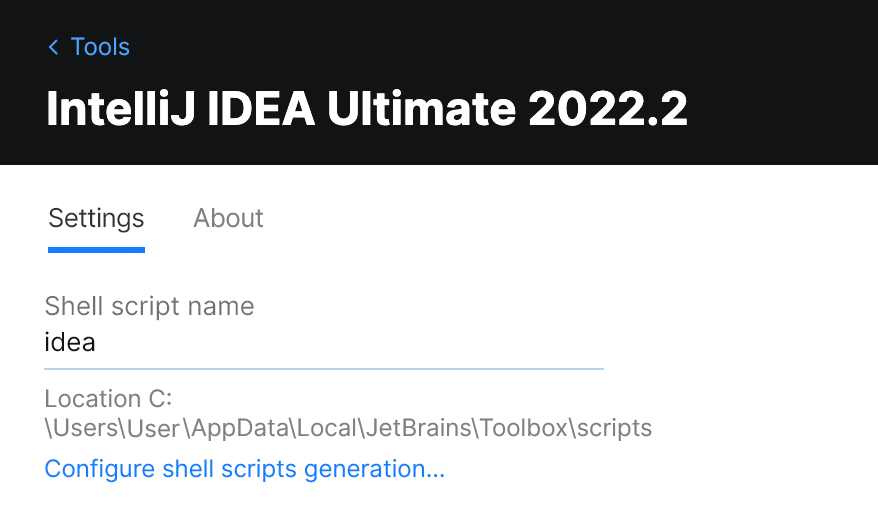
/usr/local/binor
~/Library/Application Support/JetBrains/Toolbox/scriptsBy default, the Toolbox App puts shell scripts in a directory from the system PATH environment variable, so you can run the name of the script as a command to launch RustRover from any working directory.
Open the Toolbox App, click the Toolbox App menu icon in the top right corner, and select Settings.

On the Settings tab, expand the Tools section, and specify another folder in the Shell scripts location field.
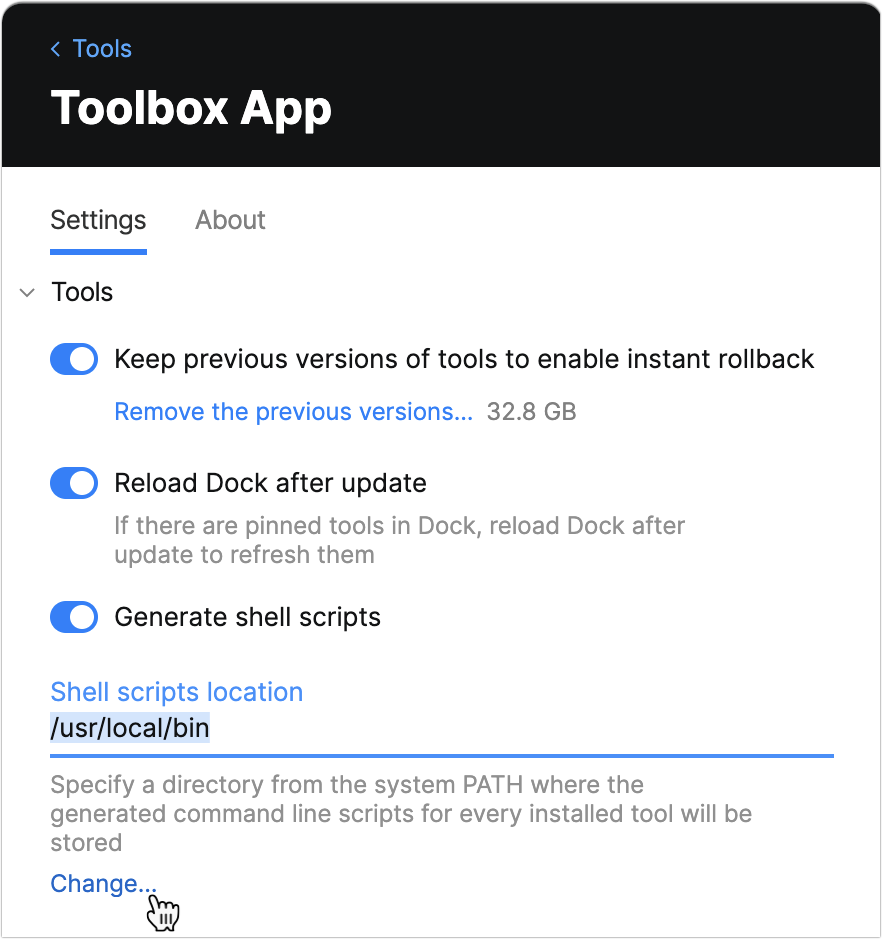
If you have several versions of the same IDE, the Toolbox App generates a shell script for each version with a unique name. You can change the name of the shell script for an IDE instance in the settings for this specific instance.
Open the Toolbox App.
Click
next to an IDE instance and select Settings.
At the bottom of the Configuration section, change the Shell script name field.

~/.local/share/JetBrains/Toolbox/scriptsBy default, the Toolbox App puts shell scripts in a directory from the system PATH environment variable, so you can run the name of the script as a command to launch RustRover from any working directory.
Open the Toolbox App, click the Toolbox App menu icon in the top right corner, and select Settings.

On the Settings tab, expand the Tools section, and specify another folder in the Shell scripts location field.
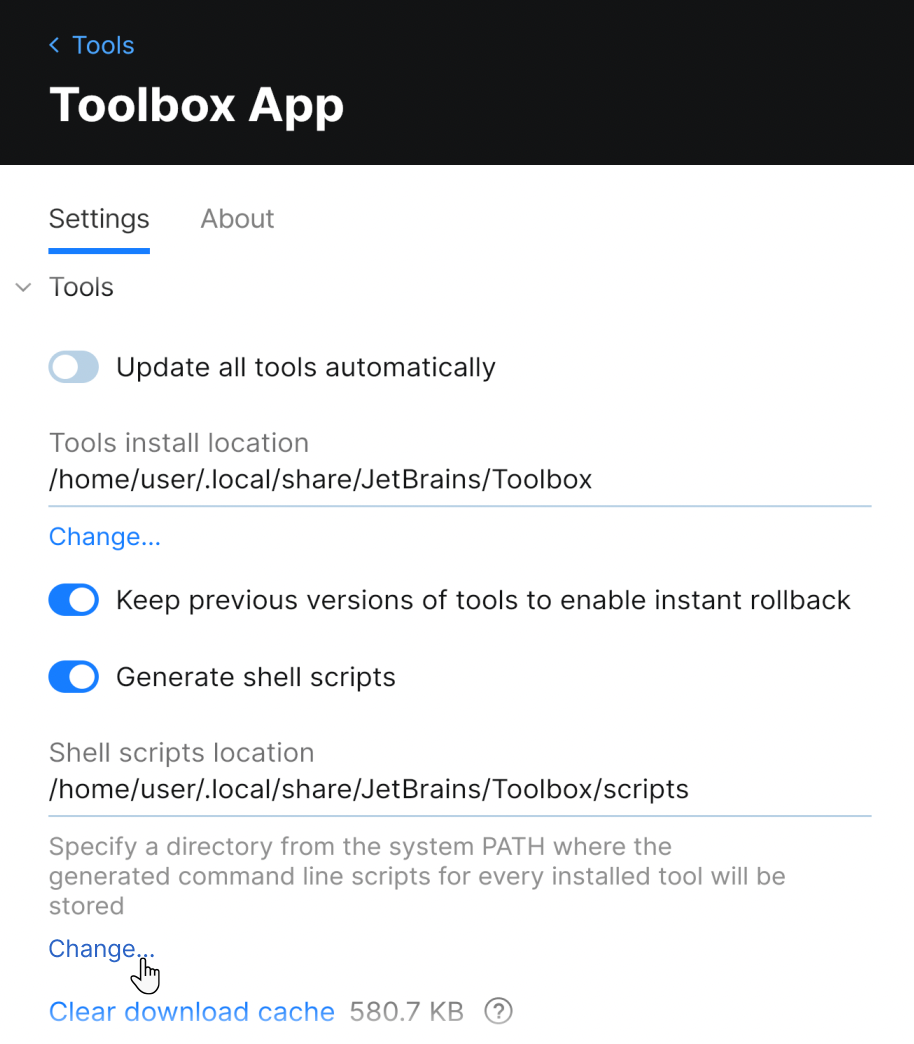
If you have several versions of the same IDE, the Toolbox App generates a shell script for each version with a unique name. You can change the name of the shell script for an IDE instance in the settings for this specific instance.
Open the Toolbox App.
Click
next to an IDE instance and select Settings.
At the bottom of the Configuration section, change the Shell script name field.

The launcher script accepts commands, options, and other arguments to modify its behavior. Without any arguments, the script launches RustRover. If you specify the path to a file or directory, RustRover will open the specified file or directory.
diffOpen the diff viewer to see the differences between two specified files.
mergeOpen the Merge dialog to merge the specified files.
formatApply code style formatting to the specified files.
inspectPerform code inspection on the specified project.
installPluginsInstall plugins by plugin ID from the JetBrains Marketplace or a custom plugin repository.
nosplashDo not show the splash screen when loading RustRover.
dontReopenProjectsDo not reopen projects and show the welcome screen. This can help if a project that was open crashes RustRover.
disableNonBundledPluginsDo not load manually installed plugins. This can help if a plugin that you installed crashes RustRover. You will be able to start the IDE and either disable or uninstall the problematic plugin.
--waitWait for the files to be closed before returning to the command prompt.
For example, you can open file.txt with the following command:
rust --wait file.txtThe shell will be waiting until file.txt is closed.